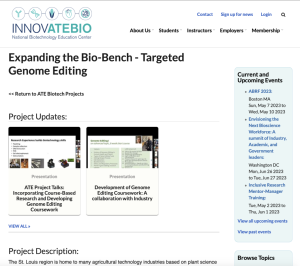Expanding the Bio-Bench: Targeted Genome Editing

The St. Louis region is home to many agricultural technology industries based on plant science research. These include both large companies such as Bayer Crop Sciences (formerly Monsanto) and the Donald Danforth Plant Science Center, and small start-up companies. As basic research in genetics leads to the development of new technologies across these companies, current and future employees must learn new skills. Through this project, to address growing industry education and training needs, St. Louis Community College (STLCC) will develop new courses in targeted genome editing to enhance its Biotechnology AAS and Certificate programs. The project will combine academic and industry interests to develop a set of courses that will meet the high standards needed in a demanding but fulfilling field. STLCC will collaborate with industry partners in the development, testing, and refinement of curriculum pertaining to targeted genome editing. As a result STLCC's 2-year biotechnician graduates will be able to gain cutting edge training and education, internship, and employment opportunities. These programmatic improvements will support the region's need for qualified technicians and extend graduates' employment opportunities to national and international enterprises.
Building on the success of a previous ATE award, this project will develop a highly technical curriculum, driven by industry needs, to address the demand for mid-level technicians with genome editing bench skills, including critical downstream assessment capabilities to evaluate the success or failure of the intended genomic change. The development of these courses will benefit new students entering the Biotechnology program at STLCC and will also be available to incumbent workers in need of these additional skills to advance in their current positions. Students and incumbent workers will also gain valuable specialized training on the equipment obtained through this award. With the support of leaders at all levels of the region's bioscience industry this academic-business partnership will ensure the project's skills curriculum, and its implementation, will meet the needs of researchers and provide highly skilled, technically proficient graduates.
Comments